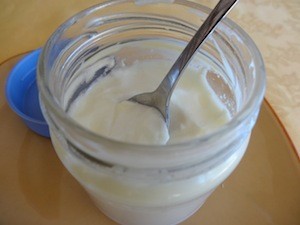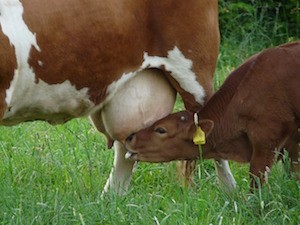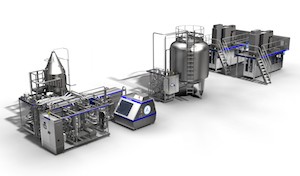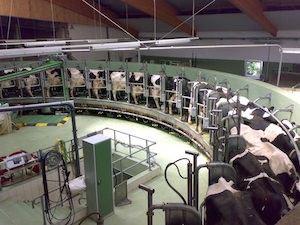Nutrients
Pros: It contains both soluble and fat-soluble vitamins, among them vitamins B, C, A, niacin and riboflavin. It also contains calcium, iron and protein.
Cons: The industrial processes that milk undergoes destroy vitamins and alter proteins, making them useless. The calcium in milk is not absorbable and the damage that milk produces in the intestine prevents the absorption of minerals.
Calcium
 Pros: Many scientific studies show that dairy products help keep bones stronger and thus prevent osteoporosis. Calcium is well absorbed due to the following facts:
Pros: Many scientific studies show that dairy products help keep bones stronger and thus prevent osteoporosis. Calcium is well absorbed due to the following facts:
1.- Milk calcium is found in the form of calcium salts (caseinates and phosphates) which makes it more absorbable.
2.- Lactose (milk sugar) enhances calcium absorption.
Cons: Many scientific studies show that dairy products are demineralizing and cause osteoporosis, due to the following facts:
1. Dairy products are acidifying, thus calcium is required to neutralize the acidity. The balance between the necessary calcium and the calcium contributed to acid neutralization is negative.
2. Calcium from dairy products is not absorbed because of the following:
* Excess phosphorus, lack of magnesium and vitamin C;
* The calcium becomes inorganic after pasteurization processes (according to the approximation of Science of Life);
* Intolerances and allergies to dairy products damage the intestine so that the complete absorption of all nutrients is not possible (according to Dr. Mouton)
3. In Eastern countries, in populations where people still follow a traditional diet which is devoid of dairy products, the rate of osteoporosis and many other diseases is much lower. These same people develop osteoporosis and other diseases of the Western civilization when they consume this type of food. Whereas in those countries where people have a diet that is rich in protein and calcium, such as the Eskimos, one of the highest levels of osteoporosis in the world can be found.
Comment: According to my observations, calcium makes bones grow and thus makes people grow taller. However, this does not indicate that they become stronger, but quite the opposite. Although bones and teeth are larger, fractures and cavities in these cases are more numerous.
Read this article to learn more about the causes of mineral deficiency.
Lactose
Pros: Medicine states that only a small percentage of the population is lactose intolerant. The fact that people adapt to the consumption of milk in adulthood, continuing lactase production beyond the nursing period supposed great progress for humanity and their settlement in villages.
In any case, nowadays we can find products without lactose in the market.
 Dr. Campbell-McBride defends the consumption of home-made kefir and yogurt, fermented for 24 hours to remove all lactose. She also approves of the consumption of very cured cheeses where lactose is virtually nonexistent.
Dr. Campbell-McBride defends the consumption of home-made kefir and yogurt, fermented for 24 hours to remove all lactose. She also approves of the consumption of very cured cheeses where lactose is virtually nonexistent.
Cons: The enzyme that digests lactose and lactase decreases gradually after weaning, so that adults do not digest lactose. Dr. Campbell-McBride explains that some beneficial intestinal bacteria, such as E-coli, perform this digestion for us. However, if the bacterial flora is unbalanced and lack these bacteria, we suffer from lactose intolerance.
Comment: While it is true that some intestinal bacteria digest lactose, they also produce toxins as digestion residues, which are considered harmful to health in some studies, therefore they can not be regarded as beneficial bacteria.
Casein:
Cons: Some studies claim that some people can not digest casein from animal milk properly, producing the so-called opioid peptides, which are toxins that may cause many neurological and psychological diseases.
Other theories argue that when a person suffers leaky gut syndrome, and at the same time he/she does not have the necessary enzymes to digest casein, then an immune reaction of allergy or intolerance to this protein occurs in their blood. This immune response is responsible for many symptoms associated with various inflammatory, allergic, respiratory, skin diseases, etc.
 Dr. Seignalet’s theory is that animal casein is not digestible by humans at all because the domestication of animals occurred very recently in the history of mankind, only 11.000 years ago, compared to the 2 million years that man exists on earth, and our enzymes have not been able to adapt to digesting casein.
Dr. Seignalet’s theory is that animal casein is not digestible by humans at all because the domestication of animals occurred very recently in the history of mankind, only 11.000 years ago, compared to the 2 million years that man exists on earth, and our enzymes have not been able to adapt to digesting casein.
The Life Science school of thought argues that while people can adapt to certain suboptimal foods such as milk, when their best food is scarce, their health will not be optimal either. Thus, people can avoid starvation consuming suboptimal food, and although they remain alive, it will be at the expense of suffering from chronic diseases.
Defense: Only a small percentage of people is allergic to casein. People and animals adapt quickly to their environment and 11.000 years are long enough to accommodate a food.
Comment: Animal milk is not one of our best foodstuffs. Some people’s bodies show inability to digest dairy products with a vigorous rejection by developing allergies and gastrointestinal diseases. People who do not show this rejection are thought to tolerate dairy products. But it is a misleading tolerance that might be at the expense of suffering long-term chronic diseases that may range from auto-immune, hormonal, respiratory diseases etc. to neurological diseases and even cancer.
Hormones
Cons: Milk naturally contains growth hormones (IGF-1 and IGF-2) that stimulate cell multiplication. Some studies relate the presence of these hormones in excess with cancer, especially breast and prostate cancers.
Moreover, in some countries such as the US, cows are given an additional hormone (rBGH) to raise their amount of IGF-1 so that they increase milk production.
Fats
Cons: Milk is rich in saturated fats, which favor cardiovascular disease and certain cancer types, especially breast cancer.
Defense: The relationship between saturated fat and heart disease has now proven not to be true. (see this article)
Specificity
Cons: Only domestic animals and people consume milk from animals of other species. Animals may also be wrong when offered foods that are not natural in their environment. An animal shall eat refined sugar when offered, even if it is harmful to its health. However, refined sugar is never found naturally in its environment.
 According to the definition of milk in any dictionary, like this one, milk is “The white liquid produced by women and other female mammals as food for their young” .
According to the definition of milk in any dictionary, like this one, milk is “The white liquid produced by women and other female mammals as food for their young” .
Therefore, milk is specifically designed to be food for the young of the same species, not for adults or for babies of different species.
Cow's milk contains hormones needed by a calf to become a cow, a significant growth in terms of weight, but reduced in terms of brain development. On the other hand, a baby needs a much more important brain development and less body growth. That is why the composition of human milk contains hormones, fatty acids, sugars, proteins, enzymes, antibodies, etc. for a proper intellectual and physical development. Read more about it in this article.
Defense: It is true that the best food for infants is human breast milk, but milk is a complete food for children who have already finished their feeding, as well as for adults.
Elimination and reintroduction test
Pros: Many people feel worse when dairy products are removed from their diet. Usually they become more tired, and their rate of calcium in blood decreases.
By avoiding dairy products for a while, people develop intolerance to them, as the body stops producing the necessary enzymes for their digestion.
Cons: When dairy products are removed during a sufficient period of time, most people are likely to experience better health. By reintroducing these products, they get worse again.
Some people experience some discomfort at the beginning of the period of elimination. This is called detoxification reaction. This phenomenon is believed to happen due to three possible circumstances. Firstly, due to the addiction caused by milk products, because of the production of endorphins and opioid peptides, so withdrawal symptoms are experienced. Secondly, the free antibodies that could bind to the antigens (casein) earlier, are free now, causing certain symptoms. In the third place, milk is an emotionally charged food with connotations that lead to the childhood, security and maternal well-being. Read more about the possible adverse reactions of detoxification in this article.
The reaction of intolerance experienced by reintroducing dairy products can be interpreted differently. As discussed under the topic Casein, some people seem to experience a rejection or intolerance, and others some misleading tolerance. When someone stops consuming dairy products, the body is healed from its chronic disease and acquires the necessary strength to move from this state of misleading tolerance to a state in which it defends itself against a food that is unhealthy and shows its disagreement with immediate acute symptoms.
Comment: When we are in the mountains and a truck goes by, the smell of its smoke seems really aggressive. However, in a city it is virtually unnoticed. Something similar happens to our body. When we are intoxicated by some substance or harmful food, a little bit of it is not significant. However, when the body is detoxified of this substance, the effects of a small amount of it can be certainly important.
Industrial processes
 Pros: Industrial processes are necessary to eliminate pathogenic bacteria that may be found in raw milk. In the past, unpasteurized milk was responsible for numerous epidemics that do not exist nowadays.
Pros: Industrial processes are necessary to eliminate pathogenic bacteria that may be found in raw milk. In the past, unpasteurized milk was responsible for numerous epidemics that do not exist nowadays.
Cons: Industrial pasteurization and homogenization destroy properties of milk. Proteins and fats are modified and turned into unusable substances, vitamins and enzymes are destroyed, etc. Moreover, some bacteria resist pasteurization, such as Listeria and Clostridium spores.
Defense: Raw milk that has not undergone these processes is good for health. Raw milk contains white blood cells and is able to defend itself against pathogenic bacteria for two days. If consumed during this time, it does not create problems. However, pasteurized milk does not contain any agents of defense, and is therefore more vulnerable to infections.
Ecology and cruelty
Cons:
1.- In farm-factories the calves are separated from their mothers after 24 hours of their birth in order to take advantage of all the milk for commercial purposes. Calves are fed with artificial milk. This separation is a trauma for both the calves and the mothers, who cry and moo for their young for days.
 2.- Cows are exploited to optimize milk production. A cow can naturally produce 500 liters of milk per year, now exceeding 10.000 liters per year. To be able to do this, producers keep cows constantly pregnant by using artificial insemination. Due to these conditions of life, cows die within 4-6 years, long before the 20 years which is their normal life expectancy.
2.- Cows are exploited to optimize milk production. A cow can naturally produce 500 liters of milk per year, now exceeding 10.000 liters per year. To be able to do this, producers keep cows constantly pregnant by using artificial insemination. Due to these conditions of life, cows die within 4-6 years, long before the 20 years which is their normal life expectancy.
3.- Intensive farming is one of the main responsible factors of the production of greenhouse gases, as well as of water pollution and deforestation, due to logging and burning of forests in order to grow grain to feed cows.
4.- Cattle in farm-factories is subjected to conditions of confinement, inadequate food in CAFOs (Concentrated Animal Feeding Operations) from grains, protein concentrates and vitamins instead of grass; and over-exploitation of cows for milk production causes them a lack of exercise, lack of sun exposure and a lack of receiving the right nutrients. As a result the animals get sick and must be treated with antibiotics. These antibiotics are found in milk and meat and are a cause that aggravates the problem of antibiotic resistance, in addition to the destruction of the intestinal flora.
Pros: These conditions are not met in the production of organic milk, where cows are treated with respect.
Other health effects
Cons: Some studies link the consumption of dairy products with cardiovascular diseases, autoimmune and inflammatory diseases, precocious puberty, constant mucus that some children suffer from, gastroenterological diseases, dermatitis and respiratory allergies, anemia, etc.
Defense: There are no scientifically accepted studies that prove the relationship between dairy products and all these diseases.
Bibliography
* Nathalie Delecroix et Jean-Marie Delecroix, “Le lait, ami ou ennemi ?”
* Thierry Souccar, “Lait, Mensonges et Propagande”
* Dr. Nicolas Le Berre, “Le lait: une sacrée vacherie”
* Dr. Christian Tal Schaller, “La viande et le lait”
* Nicolas Le Berre, Hervé Queinnec , “Soyons moins lait!”
* Dr. Carol Vachon, “Pour l’amour du bon lait”
* Robert Thompson M.D, Kathleen Barnes, “The calcium lie”
* Albert Cohen, “Milk, The deadly poison”, http://www.notmilk.com/
* T. Colin Campbell, “12 Frightening Facts About Milk”
* Dr. Georges Mounton, "Ecosystème intestinal et santé optimale"
* Dr. Natasha Campbell-McBride, "Gut and Psychology Syndrome"
Pros: It contains both soluble and fat-soluble vitamins, among them vitamins B, C, A, niacin and riboflavin. It also contains calcium, iron and protein.
Cons: The industrial processes that milk undergoes destroy vitamins and alter proteins, making them useless. The calcium in milk is not absorbable and the damage that milk produces in the intestine prevents the absorption of minerals.
Calcium
 Pros: Many scientific studies show that dairy products help keep bones stronger and thus prevent osteoporosis. Calcium is well absorbed due to the following facts:
Pros: Many scientific studies show that dairy products help keep bones stronger and thus prevent osteoporosis. Calcium is well absorbed due to the following facts:1.- Milk calcium is found in the form of calcium salts (caseinates and phosphates) which makes it more absorbable.
2.- Lactose (milk sugar) enhances calcium absorption.
Cons: Many scientific studies show that dairy products are demineralizing and cause osteoporosis, due to the following facts:
1. Dairy products are acidifying, thus calcium is required to neutralize the acidity. The balance between the necessary calcium and the calcium contributed to acid neutralization is negative.
2. Calcium from dairy products is not absorbed because of the following:
* Excess phosphorus, lack of magnesium and vitamin C;
* The calcium becomes inorganic after pasteurization processes (according to the approximation of Science of Life);
* Intolerances and allergies to dairy products damage the intestine so that the complete absorption of all nutrients is not possible (according to Dr. Mouton)
3. In Eastern countries, in populations where people still follow a traditional diet which is devoid of dairy products, the rate of osteoporosis and many other diseases is much lower. These same people develop osteoporosis and other diseases of the Western civilization when they consume this type of food. Whereas in those countries where people have a diet that is rich in protein and calcium, such as the Eskimos, one of the highest levels of osteoporosis in the world can be found.
Comment: According to my observations, calcium makes bones grow and thus makes people grow taller. However, this does not indicate that they become stronger, but quite the opposite. Although bones and teeth are larger, fractures and cavities in these cases are more numerous.
Read this article to learn more about the causes of mineral deficiency.
Lactose
Pros: Medicine states that only a small percentage of the population is lactose intolerant. The fact that people adapt to the consumption of milk in adulthood, continuing lactase production beyond the nursing period supposed great progress for humanity and their settlement in villages.
In any case, nowadays we can find products without lactose in the market.
 Dr. Campbell-McBride defends the consumption of home-made kefir and yogurt, fermented for 24 hours to remove all lactose. She also approves of the consumption of very cured cheeses where lactose is virtually nonexistent.
Dr. Campbell-McBride defends the consumption of home-made kefir and yogurt, fermented for 24 hours to remove all lactose. She also approves of the consumption of very cured cheeses where lactose is virtually nonexistent.Cons: The enzyme that digests lactose and lactase decreases gradually after weaning, so that adults do not digest lactose. Dr. Campbell-McBride explains that some beneficial intestinal bacteria, such as E-coli, perform this digestion for us. However, if the bacterial flora is unbalanced and lack these bacteria, we suffer from lactose intolerance.
Comment: While it is true that some intestinal bacteria digest lactose, they also produce toxins as digestion residues, which are considered harmful to health in some studies, therefore they can not be regarded as beneficial bacteria.
Casein:
Cons: Some studies claim that some people can not digest casein from animal milk properly, producing the so-called opioid peptides, which are toxins that may cause many neurological and psychological diseases.
Other theories argue that when a person suffers leaky gut syndrome, and at the same time he/she does not have the necessary enzymes to digest casein, then an immune reaction of allergy or intolerance to this protein occurs in their blood. This immune response is responsible for many symptoms associated with various inflammatory, allergic, respiratory, skin diseases, etc.
 Dr. Seignalet’s theory is that animal casein is not digestible by humans at all because the domestication of animals occurred very recently in the history of mankind, only 11.000 years ago, compared to the 2 million years that man exists on earth, and our enzymes have not been able to adapt to digesting casein.
Dr. Seignalet’s theory is that animal casein is not digestible by humans at all because the domestication of animals occurred very recently in the history of mankind, only 11.000 years ago, compared to the 2 million years that man exists on earth, and our enzymes have not been able to adapt to digesting casein.The Life Science school of thought argues that while people can adapt to certain suboptimal foods such as milk, when their best food is scarce, their health will not be optimal either. Thus, people can avoid starvation consuming suboptimal food, and although they remain alive, it will be at the expense of suffering from chronic diseases.
Defense: Only a small percentage of people is allergic to casein. People and animals adapt quickly to their environment and 11.000 years are long enough to accommodate a food.
Comment: Animal milk is not one of our best foodstuffs. Some people’s bodies show inability to digest dairy products with a vigorous rejection by developing allergies and gastrointestinal diseases. People who do not show this rejection are thought to tolerate dairy products. But it is a misleading tolerance that might be at the expense of suffering long-term chronic diseases that may range from auto-immune, hormonal, respiratory diseases etc. to neurological diseases and even cancer.
Hormones
Cons: Milk naturally contains growth hormones (IGF-1 and IGF-2) that stimulate cell multiplication. Some studies relate the presence of these hormones in excess with cancer, especially breast and prostate cancers.
Moreover, in some countries such as the US, cows are given an additional hormone (rBGH) to raise their amount of IGF-1 so that they increase milk production.
Fats
Cons: Milk is rich in saturated fats, which favor cardiovascular disease and certain cancer types, especially breast cancer.
Defense: The relationship between saturated fat and heart disease has now proven not to be true. (see this article)
Specificity
Cons: Only domestic animals and people consume milk from animals of other species. Animals may also be wrong when offered foods that are not natural in their environment. An animal shall eat refined sugar when offered, even if it is harmful to its health. However, refined sugar is never found naturally in its environment.
 According to the definition of milk in any dictionary, like this one, milk is “The white liquid produced by women and other female mammals as food for their young” .
According to the definition of milk in any dictionary, like this one, milk is “The white liquid produced by women and other female mammals as food for their young” .Therefore, milk is specifically designed to be food for the young of the same species, not for adults or for babies of different species.
Cow's milk contains hormones needed by a calf to become a cow, a significant growth in terms of weight, but reduced in terms of brain development. On the other hand, a baby needs a much more important brain development and less body growth. That is why the composition of human milk contains hormones, fatty acids, sugars, proteins, enzymes, antibodies, etc. for a proper intellectual and physical development. Read more about it in this article.
Defense: It is true that the best food for infants is human breast milk, but milk is a complete food for children who have already finished their feeding, as well as for adults.
Elimination and reintroduction test
Pros: Many people feel worse when dairy products are removed from their diet. Usually they become more tired, and their rate of calcium in blood decreases.
By avoiding dairy products for a while, people develop intolerance to them, as the body stops producing the necessary enzymes for their digestion.
Cons: When dairy products are removed during a sufficient period of time, most people are likely to experience better health. By reintroducing these products, they get worse again.
Some people experience some discomfort at the beginning of the period of elimination. This is called detoxification reaction. This phenomenon is believed to happen due to three possible circumstances. Firstly, due to the addiction caused by milk products, because of the production of endorphins and opioid peptides, so withdrawal symptoms are experienced. Secondly, the free antibodies that could bind to the antigens (casein) earlier, are free now, causing certain symptoms. In the third place, milk is an emotionally charged food with connotations that lead to the childhood, security and maternal well-being. Read more about the possible adverse reactions of detoxification in this article.
The reaction of intolerance experienced by reintroducing dairy products can be interpreted differently. As discussed under the topic Casein, some people seem to experience a rejection or intolerance, and others some misleading tolerance. When someone stops consuming dairy products, the body is healed from its chronic disease and acquires the necessary strength to move from this state of misleading tolerance to a state in which it defends itself against a food that is unhealthy and shows its disagreement with immediate acute symptoms.
Comment: When we are in the mountains and a truck goes by, the smell of its smoke seems really aggressive. However, in a city it is virtually unnoticed. Something similar happens to our body. When we are intoxicated by some substance or harmful food, a little bit of it is not significant. However, when the body is detoxified of this substance, the effects of a small amount of it can be certainly important.
Industrial processes
 Pros: Industrial processes are necessary to eliminate pathogenic bacteria that may be found in raw milk. In the past, unpasteurized milk was responsible for numerous epidemics that do not exist nowadays.
Pros: Industrial processes are necessary to eliminate pathogenic bacteria that may be found in raw milk. In the past, unpasteurized milk was responsible for numerous epidemics that do not exist nowadays.Cons: Industrial pasteurization and homogenization destroy properties of milk. Proteins and fats are modified and turned into unusable substances, vitamins and enzymes are destroyed, etc. Moreover, some bacteria resist pasteurization, such as Listeria and Clostridium spores.
Defense: Raw milk that has not undergone these processes is good for health. Raw milk contains white blood cells and is able to defend itself against pathogenic bacteria for two days. If consumed during this time, it does not create problems. However, pasteurized milk does not contain any agents of defense, and is therefore more vulnerable to infections.
Ecology and cruelty
Cons:
1.- In farm-factories the calves are separated from their mothers after 24 hours of their birth in order to take advantage of all the milk for commercial purposes. Calves are fed with artificial milk. This separation is a trauma for both the calves and the mothers, who cry and moo for their young for days.
 2.- Cows are exploited to optimize milk production. A cow can naturally produce 500 liters of milk per year, now exceeding 10.000 liters per year. To be able to do this, producers keep cows constantly pregnant by using artificial insemination. Due to these conditions of life, cows die within 4-6 years, long before the 20 years which is their normal life expectancy.
2.- Cows are exploited to optimize milk production. A cow can naturally produce 500 liters of milk per year, now exceeding 10.000 liters per year. To be able to do this, producers keep cows constantly pregnant by using artificial insemination. Due to these conditions of life, cows die within 4-6 years, long before the 20 years which is their normal life expectancy.3.- Intensive farming is one of the main responsible factors of the production of greenhouse gases, as well as of water pollution and deforestation, due to logging and burning of forests in order to grow grain to feed cows.
4.- Cattle in farm-factories is subjected to conditions of confinement, inadequate food in CAFOs (Concentrated Animal Feeding Operations) from grains, protein concentrates and vitamins instead of grass; and over-exploitation of cows for milk production causes them a lack of exercise, lack of sun exposure and a lack of receiving the right nutrients. As a result the animals get sick and must be treated with antibiotics. These antibiotics are found in milk and meat and are a cause that aggravates the problem of antibiotic resistance, in addition to the destruction of the intestinal flora.
Pros: These conditions are not met in the production of organic milk, where cows are treated with respect.
Other health effects
Cons: Some studies link the consumption of dairy products with cardiovascular diseases, autoimmune and inflammatory diseases, precocious puberty, constant mucus that some children suffer from, gastroenterological diseases, dermatitis and respiratory allergies, anemia, etc.
Defense: There are no scientifically accepted studies that prove the relationship between dairy products and all these diseases.
Bibliography
* Nathalie Delecroix et Jean-Marie Delecroix, “Le lait, ami ou ennemi ?”
* Thierry Souccar, “Lait, Mensonges et Propagande”
* Dr. Nicolas Le Berre, “Le lait: une sacrée vacherie”
* Dr. Christian Tal Schaller, “La viande et le lait”
* Nicolas Le Berre, Hervé Queinnec , “Soyons moins lait!”
* Dr. Carol Vachon, “Pour l’amour du bon lait”
* Robert Thompson M.D, Kathleen Barnes, “The calcium lie”
* Albert Cohen, “Milk, The deadly poison”, http://www.notmilk.com/
* T. Colin Campbell, “12 Frightening Facts About Milk”
* Dr. Georges Mounton, "Ecosystème intestinal et santé optimale"
* Dr. Natasha Campbell-McBride, "Gut and Psychology Syndrome"
 Milk and dairy products are some of the most controversial issues in the science of nutrition. Conventional medicine defends them as some of the most important foods, essential for the calcium in our bones, while many nutritionists and naturopaths have argued for many years that it might be the cause of many diseases.
Milk and dairy products are some of the most controversial issues in the science of nutrition. Conventional medicine defends them as some of the most important foods, essential for the calcium in our bones, while many nutritionists and naturopaths have argued for many years that it might be the cause of many diseases.











